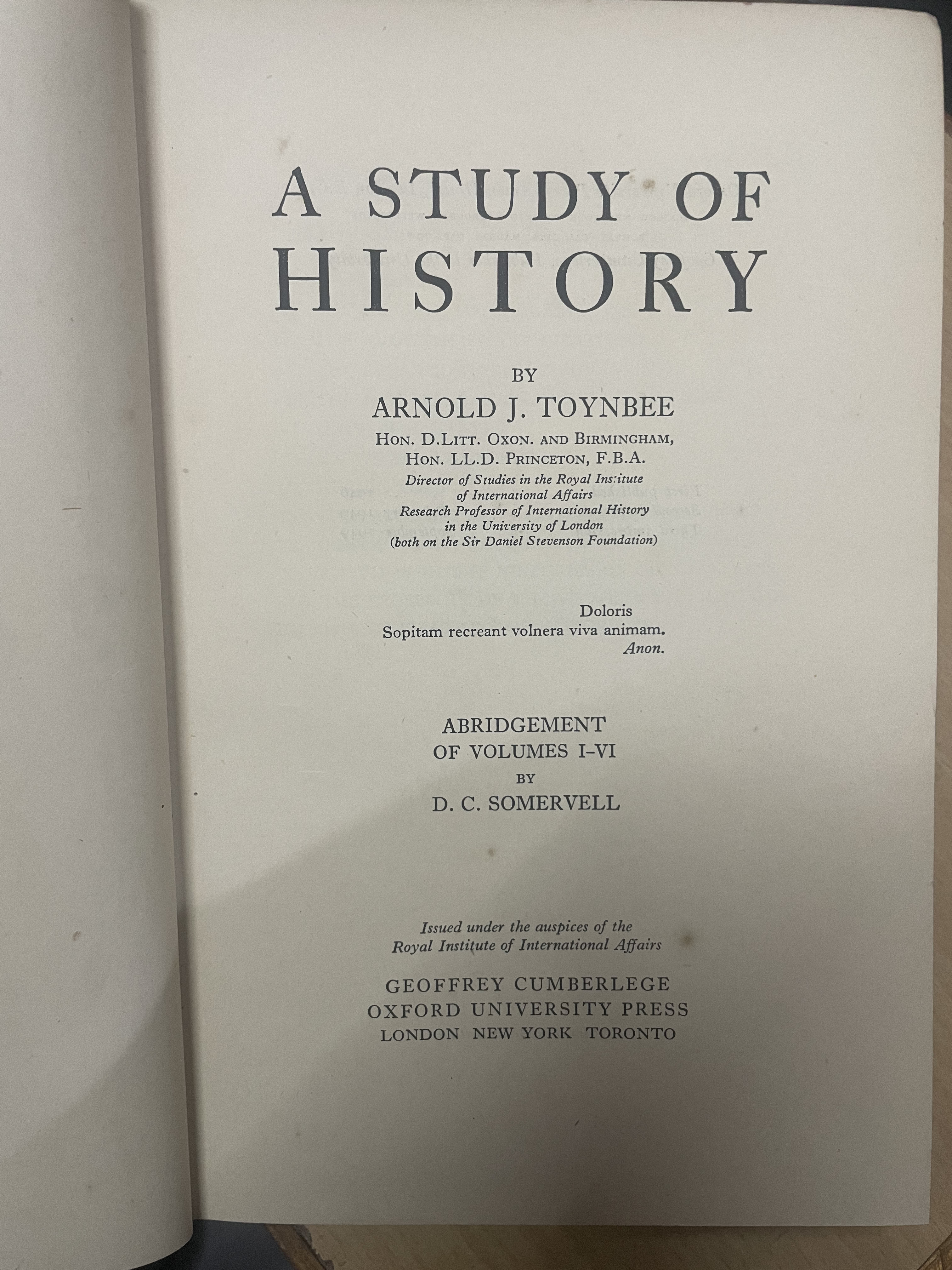A study of History

About
Summary
Exquisite
TOC
Details
Related
URL
Images
Overview
A Study of History is a 12-volume universal history written by British historian Arnold J. Toynbee, published between 1934 and 1961. The massive work explores the rise and fall of civilizations throughout human history, seeking to identify patterns and processes that explain their development and decline.
A Study of History presents a grand, comparative analysis of civilizations, rather than focusing on individual nations or events. Toynbee identifies 19 or 21 major civilizations, tracing their development through a recurring cycle of genesis, growth, a time of troubles, the emergence of a universal state, and eventual disintegration. He categorizes civilizations as Egyptian, Andean, Sumerian, Babylonic, Hittite, Minoan, Indic, Hindu, Syriac, Hellenic, Western, Orthodox Christian (Byzantine and Russian branches), Far Eastern (Chinese and Japanese-Korean branches), Islamic (Arabic and Iranic branches), Mayan, Mexican, and Yucatec. Additionally, Toynbee identifies three abortive civilizations and five arrested civilizations, bringing the total to 27 or 29.
Toynbee's approach involves examining civilizations as wholes, comparing their experiences, and identifying common patterns in their histories. He argues that civilizations are not shaped primarily by race or environment, but by their responses to challenges. Successful responses lead to growth, while failures result in decline.
Importance of Book
Comparative Civilizational Analysis: It offers a unique, comparative perspective on world history, examining civilizations across different times and places.
Identification of Historical Patterns: Toynbee attempts to identify recurring patterns and processes in the rise and fall of civilizations, providing a framework for understanding historical change.
Interdisciplinary Approach: The work draws on insights from various disciplines, including history, philosophy, religion, and sociology, to provide a comprehensive understanding of civilizations.
Stimulation of Debate: Despite its criticisms, A Study of History has stimulated debate and discussion about the nature of history and the forces that shape human societies.
Key Themes
Challenge and Response: Civilizations arise and develop through creative responses to challenges, whether environmental, social, or political. The ability to overcome these challenges determines a civilization's success.
Withdrawal-and-Return: Creative individuals and groups drive societal growth through a process of withdrawal from society, development of new ideas or capabilities, and return to share their insights with the wider community.
Mimesis: The majority of society imitates the creative minority, leading to the advancement of civilization.
Breakdown and Disintegration: Civilizations decline when they fail to respond effectively to new challenges, leading to internal divisions, social unrest, and eventual collapse.
The Role of Religion: In later volumes, Toynbee emphasizes the importance of religion as a unifying force and a source of meaning and value in civilizations.
Unity of Human Civilization: Despite the rise and fall of individual civilizations, Toynbee suggests an underlying unity to human history, with common challenges and patterns recurring across different societies.
Cultural Significance
Synthesis of Knowledge: The work represents an ambitious attempt to synthesize knowledge from diverse fields and provide a comprehensive understanding of human history.
Global Perspective: Toynbee's focus on civilizations around the world challenges Eurocentric perspectives and promotes a more global understanding of history.
Reflection of Interwar Period: The book was influenced by the events of the interwar period, including World War I and the rise of nationalism, reflecting anxieties about the future of Western civilization.
Impact on Intellectual Discourse: Despite its criticisms, A Study of History has had a significant impact on intellectual discourse, influencing historians, philosophers, and social scientists.
Effects on Society
Popular Interest in History: The book's ambitious scope and engaging writing style captured the public's imagination, stimulating interest in history and world affairs.
Influence on Policymakers: Toynbee's ideas influenced policymakers and intellectuals, particularly during the mid-20th century, shaping their understanding of international relations and global challenges.
Promotion of Global Awareness: By emphasizing the interconnectedness of civilizations and the importance of understanding different cultures, the book promoted global awareness and cross-cultural dialogue.
Critique of Nationalism: Toynbee's critique of nationalism resonated with those who saw it as a major cause of conflict and division in the modern world.
Debate on Historical Determinism: The book's thesis that civilizations follow predictable patterns has generated debate about the role of determinism and human agency in history.
Conclusion
A Study of History by Arnold J. Toynbee is an ambitious and thought-provoking work that attempts to provide a comprehensive understanding of human history. Despite its criticisms, the book remains a significant contribution to historical thought, stimulating debate and discussion about the forces that shape civilizations. Its focus on comparative analysis, recurring patterns, and the interconnectedness of human societies continues to be relevant in today's globalized world.
Title
A study of History
Author
Arnold J Toynbee
Name of Publisher
Oxford University press London
Publish Date
1946
Subject
A comprehensive analysis of the rise and fall of civilizations
Vintage
1901-1947
Number of Pages
617
Category
History
Sub Category
Literary
Rarity
RARE
